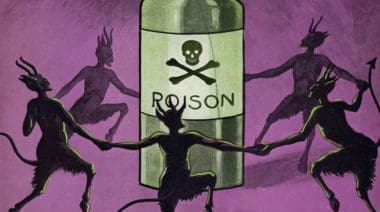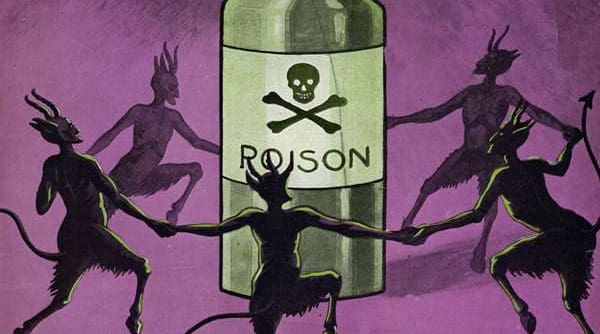I was watching a video on YouTube not too long ago. On it, I was disturbed to hear a priest say, or intimate, that the occasion of sin was itself a sin. That’s never occurred to me. It sounds so strange and it seems like, in a scrupulous person, it could fuel scrupulosity. What’s the bottom line? Is the occasion of sin itself actually a sin? Could it be a sin sometimes? And, sometimes not? Does it depend on how proximate the occasion of sin is? I really would like to get some clarification. Thank you for any help you can provide.
Since I haven’t seen the video you are referring to, I can’t give a specific answer to your question. But thank you for asking about this, since it definitely touches on points relevant for everyone’s spiritual journey. In order to determine whether an “occasion of sin” can in itself be a sin (this is your question), we have to review what sin is, and we have to understand what an occasion of sin is.
Sin is the great obstacle to spiritual progress. Here’s how the Catechism defines sin in general:
Sin is an utterance, a deed, or a desire contrary to the eternal law. It is an offense against God. It rises up against God in a disobedience contrary to the obedience of Christ. Sin is an act contrary to reason. It wounds man’s nature and injures human solidarity. (CCC 1871-1872)
 A lot of theology lies behind that simple definition, but I want to highlight only two things. First of all, sin always involves a choice. In this sense, a temptation is itself never a sin. After all, Jesus himself was tempted, but he never sinned. Always keep that in mind. Being tempted, feeling powerful temptations, is not a sin. The sin comes in depending on how we respond to those temptations.
A lot of theology lies behind that simple definition, but I want to highlight only two things. First of all, sin always involves a choice. In this sense, a temptation is itself never a sin. After all, Jesus himself was tempted, but he never sinned. Always keep that in mind. Being tempted, feeling powerful temptations, is not a sin. The sin comes in depending on how we respond to those temptations.
Sin Involves a Decision
To sin, we must make some kind of a decision, whether clear and firm, or vague and wishy-washy. For sin to be present, our freedom must somehow be involved. This means that we are always responsible, to some extent, for our sins. If we just make a mistake, we can’t call that a sin. If I take someone else’s luggage home from the airport because it looks like mine, that’s a mistake, not a sin. But if I grab someone’s briefcase while they are not looking and disappear with it into the crowd, that’s more than a mistake. It’s a choice to take for myself something that belongs to someone else. That’s the sin of theft.
Spiritual Poison
Second, sin always causes damage. Sin is wrong precisely because it is a rebellion against God’s wise and loving plan for us. God created us and wants us to flourish. His will – what the Catechism refers to as “the eternal law” – is always something good for us. So whenever we “rise up against God in disobedience”, we are acting in a destructive way, a way that will damage ourselves and those around us.
 In this sense, sin is like spiritual poison. If I eat or drink poison, it does damage to my body. It may make me sick, or paralyze me, or even kill me. My biological organism by its very nature needs certain nutrients in order to function well and stay healthy; poison is not one of them. Poison is the contrary of nourishment. In a similar way, our spiritual organism – our mind, heart, and will – require certain “nutrients” in order to grow and flourish. These are traditionally identified as what is true, good, and beautiful. When I make a morally wrong choice, I am “imbibing”, so to speak, moral evil instead of moral good. It’s spiritual poison. It does damages to my spiritual organism, to my ability to love and be loved. If repeated, it will become habitual sin, or vice. It will eat away at my spirit, destroying my interior peace, stealing any sense of lasting fulfillment, and even making me into an evil influence in the world. Sin always causes damage. This is why Jesus emphasized so much the need to repent of our sins and go to him to have our sins forgiven. This is why the Catholic Church constantly encourages us to contemplate God’s mercy and receive it through prayer and the sacraments, especially the sacraments of baptism and confession.
In this sense, sin is like spiritual poison. If I eat or drink poison, it does damage to my body. It may make me sick, or paralyze me, or even kill me. My biological organism by its very nature needs certain nutrients in order to function well and stay healthy; poison is not one of them. Poison is the contrary of nourishment. In a similar way, our spiritual organism – our mind, heart, and will – require certain “nutrients” in order to grow and flourish. These are traditionally identified as what is true, good, and beautiful. When I make a morally wrong choice, I am “imbibing”, so to speak, moral evil instead of moral good. It’s spiritual poison. It does damages to my spiritual organism, to my ability to love and be loved. If repeated, it will become habitual sin, or vice. It will eat away at my spirit, destroying my interior peace, stealing any sense of lasting fulfillment, and even making me into an evil influence in the world. Sin always causes damage. This is why Jesus emphasized so much the need to repent of our sins and go to him to have our sins forgiven. This is why the Catholic Church constantly encourages us to contemplate God’s mercy and receive it through prayer and the sacraments, especially the sacraments of baptism and confession.
Defining “Occasion of Sin”
Any person, place, or thing that of its nature or because of human frailty can lead one to do wrong, thereby committing sin. If the danger is certain and probable, the occasion is proximate; if the danger is slight, the occasion becomes remote. (http://www.therealpresence.org/archives/Q_and_A/Q_and_A_024.htm)
In other words, an “occasion of sin” is a situation that makes it easier for me to commit sin. An example will help illustrate this. Let’s say I have a habit of gossiping about people, talking behind their backs. Let’s say God gives me the grace to repent from that sin, to confess it, and to feel a strong desire to break that habit. In order to do so, it will help if I avoid situations that tend to encourage gossip (those situations are the “occasions of sin” we are considering). Maybe having lunch at the tennis club is a situation where gossip tends to rule the conversation. Or maybe going out for drinks with the guys after work is a situation where we all tend to get loose-tongued and say damaging things. Avoiding lunch at the tennis club and going straight home after work could be wise choices. They would help me avoid situations (occasions) where I tend to give in to the temptation to gossip.
Avoiding Occasions of Sin
Now we are ready to tackle your question: “Is the occasion of sin itself actually a sin? Could it be a sin sometimes?” As you can clearly see, an occasion of sin is not in itself a sin. There is nothing intrinsically wrong with going out for drinks with the guys after work. There is nothing intrinsically wrong in having lunch with buddies at the tennis club. Those are perfectly normal, healthy activities. But if I know clearly that, for me, going to lunch at the tennis club will put me in moral danger by putting me in a situation in which I will probably start gossiping, then I should avoid doing so whenever possible. If I know that something or someone is going to lead me into sin, I have an obligation to make a reasonable effort to avoid that something or someone. If I don’t, I am already saying – through the choice to enter into an easily avoidable and very clear occasion of sin – that I am willing to flirt with that temptation, I am already playing with fire.
Being Reasonable
The key here is to know what situations, activities, and relationships are helpful for my friendship with Christ, and which ones are harmful. Sometimes, I cannot avoid situations that may end up being harmful – it’s unreasonable to think that we can isolate ourselves from every sort of temptation. But in those cases where I can easily avoid something that I know will be a very strong temptation for me, I need to do what I can to avoid it. When I don’t, I become, in a certain sense, responsible for putting myself into an occasion of sin, which contributes to my responsibility for falling into that sin if indeed I do fall. In those cases, it could be considered a sin – an act of disobedience to God, a decision to distance myself from God’s will and from what is truly good for me – to purposely enter into an easily avoidable situation where I know I will likely give into temptation.
With those examples and that clarification, you may find Fr Hardon’s further elaboration helpful:
It [an occasion of sin] is voluntary if it can easily be avoided. There is no obligation to avoid a remote occasion unless there is probable danger of its becoming proximate. There is a positive obligation to avoid a voluntary proximate occasion of sin even though the occasion of evildoing is due only to human weakness.
Forging Ahead
I hope these distinctions help you understand how we can sometimes be responsible for putting ourselves in moral danger, and how choosing to do so can sometimes – but certainly not always and everywhere – be considered a sin itself. Nevertheless, the most important thing to keep in mind is not what we need to avoid, but what we need to do. If our hearts are full of a desire to know, love, and follow Christ, the Holy Spirit will fill our minds with ideas about positive steps to take for our own growth in holiness and for furthering the Church’s work of evangelization. When we shift into that gear, avoiding moral danger becomes second nature, and scrupulosity loses its sting.
Thanks again for your question. God bless you!
In Him, Fr. John
+
Art for this post asking whether the occasion of sin is a sin: The Temptation of Christ, Ary Scheffer, 1854, PD-US published before January 1, 1923; Detail of “Car-Barlick-Acid Rag” Clarence C. Wiley. Detroit, MI & NY NY: Jerome H. Remick & Co., 1905 sheet music cover., Clarence C. Wiley, 1905, PD-US copyright expired, published in the U.S. prior to January 1, 1923, Wikimedia Commons.


